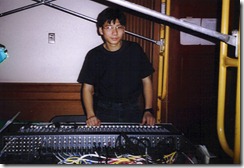Today, our studio celebrated the 10th anniversary of The Sims.
The first Sims game was released 10 years ago today. Since then, there have been two sequels (one of which I had the honor of working on), with both the original game and Sims 2 having dozens of expansion and stuff pack.
But what a different world it was back then. When the Sims first launched, Metacritic didn’t exist yet. I had not yet graduated from high school. I had not yet dreamed of ever working in the video games industry. I was fairly certain at the time that I’d probably be a computer scientist for all of my life.
I was instead updating a personal website that used frames, the marquee tag, a listbot subscription field, a guestbook, a visit counter, and had such stellar content as:
I’m back again. And I’m rip roaring ready for another fun-filled year of school. This time, it’s even more special, because (gasp!), I’m a…junior! So, I’m going back to the rat race, the drawing board, the cheese factory, the pit, the blue hallway, whatever you want. I’m going back. That means I get to see all my loyal friends (and loyal enemies). Yeah! A little bonus for you all…I now have a picture of me!
Unfortunately, that picture of me is lost forever in the Internet. Even I don’t remember whatever unfortunate hairstyle or expression I may have been wearing at the time. It probably looked a little something like this:
Anyway, the point is, the pedigree of the games that I’ve been working on for the past three years is long and grand. I’m proud to continue the work of all those who have come before me, to make games that are about creativity, storytelling, and the lives of ordinary people. I’m honored to be part of a decade-long commitment to making games that can be fun without ever requiring you to shoot anyone in the face.
Also, the celebration at work today meant I got free cake. So, that’s a big plus, too.
